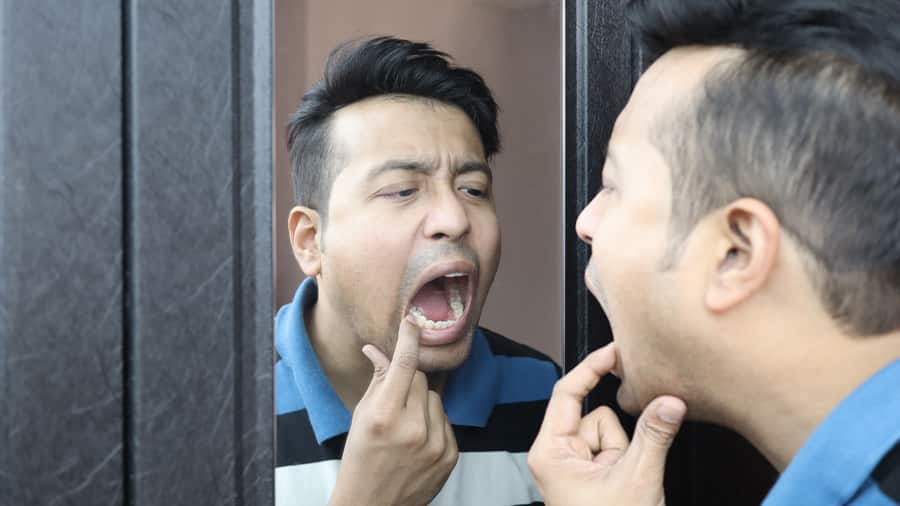Bad breath results from bacteria accumulation in the mouth. A research study published in the Indian Journal of Dental Research points out that causes of oral malodour can be local or systemic. Dry mouth and accumulation of plaque due to inadequate oral hygiene are the most common causes for the increased bacterial load. The microbes act on sulphur-containing proteinaceous substrates present in debris and plaque and produce volatile sulphur compounds which cause the malodour. The sulphur compounds are what we smell when we realise it's time to grab a mint.
The National Health Portal of India notes that bad breath or Halitosis (oral malodour) is an unpleasant odour of the mouth. It is a common complaint for both genders and for all age groups. Mild transient bad breath which often arises after sleep is common and generally not regarded as halitosis. It is termed as “morning halitosis.” Halitosis has numerous causes and origins.
- Poor Oral hygiene: Sometimes it may be a consequence of lifestyle. If you don't brush and floss daily, food particles accumulate in between your teeth and on tongue; bacteria grow on the food left in your mouth and leave foul-smelling waste products (volatile sulphur compounds) behind, which lead to bad breath. Lack of regular tongue cleaning, may be a cause of bad breath despite proper brushing and flossing.
- Dietary Habits: Intake of certain foods and drinks such as onion, garlic, spices etc. and certain habits such as smoking, using tobacco products, drinking alcohol cause halitosis. Fasting or starvation can also cause bad breath.
Do Cavities Cause Bad Breath?
Cavities are small holes in the teeth where bacteria collect and eat away at the enamel. While cavities do not directly cause bad breath, they can contribute to it. According to the Indian Dental Association, bad breath is caused by the decay of food particles that are not removed from the mouth by brushing and flossing. If you have bad breath, it does not mean you definitely have a cavity, but it's possible that you might. That's why it's important to maintain regular dental appointments and see your dentist right away if you suspect that you have a cavity or are experiencing tooth sensitivity or pain.
Manage Bad Breath and Cavities Like a Pro
One of the easiest ways to manage and prevent both bad breath and cavities is to practice good oral hygiene. Start with brushing twice a day. Brushing your teeth physically removes decay-causing bacteria and food particles. You should also floss daily to remove lingering bacteria and food particles hiding in between your teeth.
Keeping your mouth moist is important for fresh breath, too. The Indian Dental Association points out that dry mouths can be a cause of bad breath. Keeping hydrated will allow your body to produce enough saliva to keep your mouth clean. Saliva fights the growth of bacteria on your teeth. Be sure to drink plenty of water and talk to your doctor about any possible contributing factors for dry mouth, such as taking certain medications.
According to the National Health Portal of India, smoking can lead to various oral health problems including bad breath, tooth staining, gum disease, inflammation of salivary gland openings on the roof of the mouth, increase build up of plaque and calculus, loss of bone within the jaw, increased risk of leucoplakia (white patches within the mouth; a pre-cancerous lesion), delayed healing process, increased risk of developing oral cancer. Ask your doctor for strategies to help you quit.
In order to avoid bad breath, Healthy Mouth Healthy Body advises to maintain good oral hygiene, and clean your dentures among other measures. Follow your dentist's specific directions for cleaning your appliance.
Finally, seeing your dentist regularly ensures that your mouth stays healthy. A professional teeth cleaning can remove bacteria and food that your toothbrush at home may miss. Your dental professional will also check for decay that may harbour bad bacteria. If they do detect any cavities, they can fill them to stop the decay from worsening. Bad breath can be a real bummer. While cavities do not directly cause bad breath, you can prevent both bad breath and cavities by practicing good oral hygiene and seeing your dentist regularly.
This article is intended to promote understanding of and knowledge about general oral health topics. It is not intended to be a substitute for professional advice, diagnosis or treatment. Always seek the advice of your dentist or other qualified healthcare provider with any questions you may have regarding a medical condition or treatment.
ORAL HEALTH QUIZ
What's behind your smile?
Take our Oral Health assessment to get the most from your oral care routine
ORAL HEALTH QUIZ
What's behind your smile?
Take our Oral Health assessment to get the most from your oral care routine













